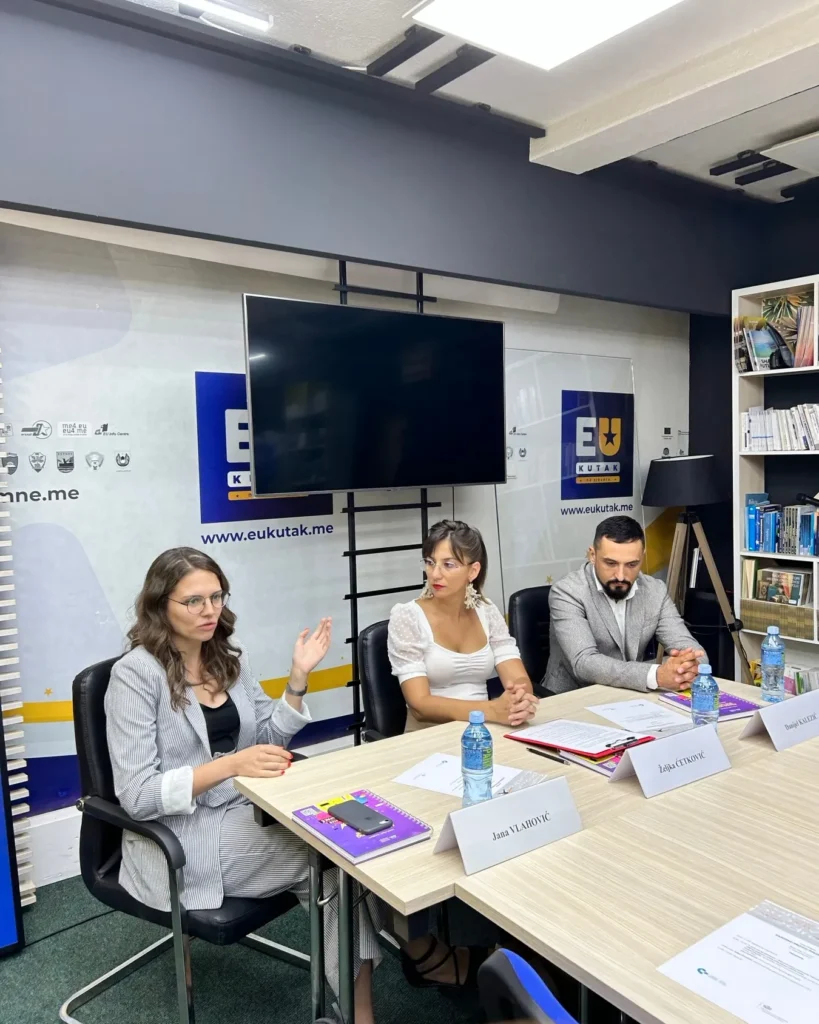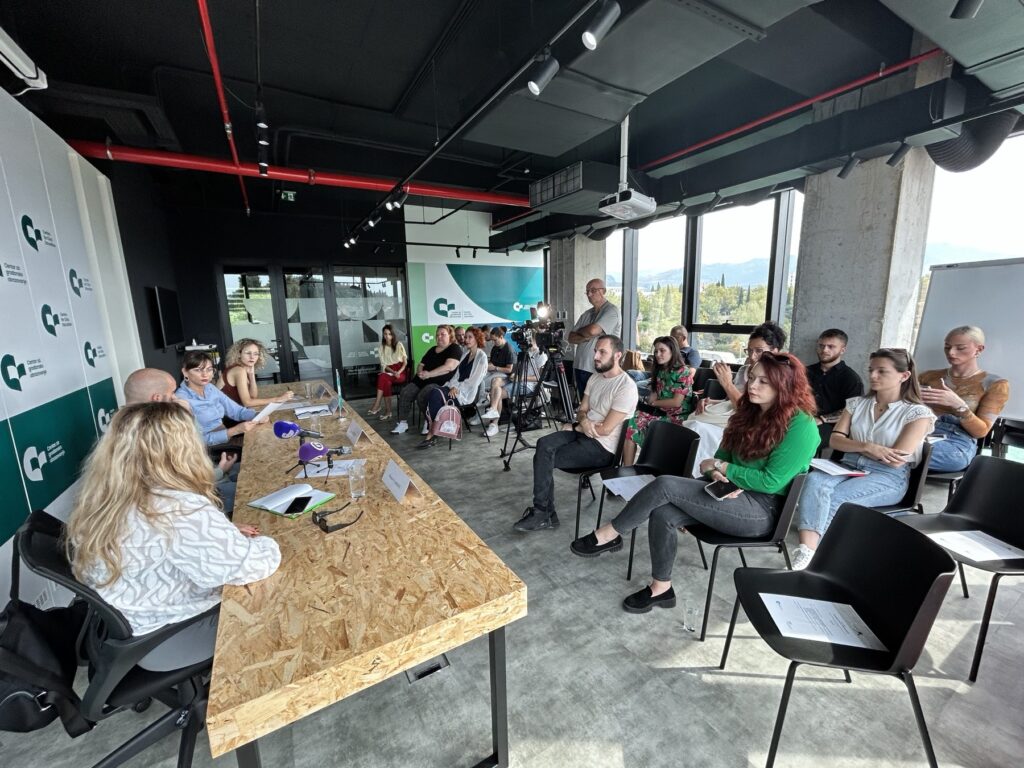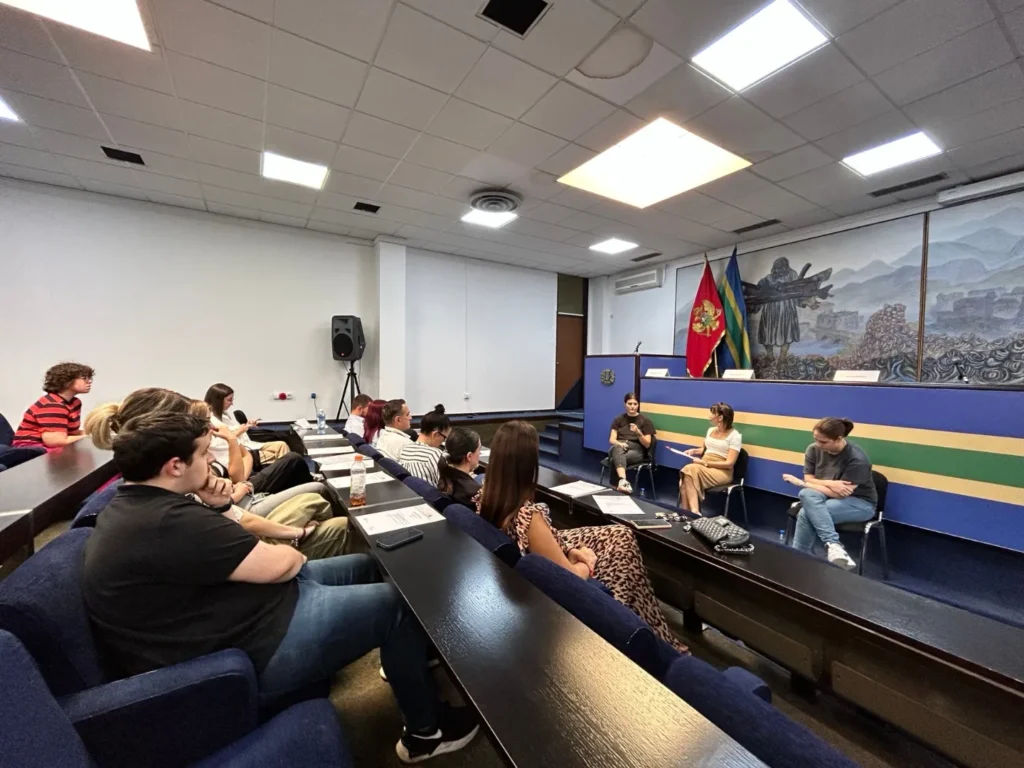Centre for Civic Education (CCE) organized three public forums in September under the name “Together Against Prejudice”, held in Bijelo Polje, Podgorica and Bar. Through intensive discussions, the rights of LGBTIQ people in Montenegro, the quality of life enjoyed by community members, various stereotypes and prejudices that accompany them, the consequences of discrimination and violence, etc. were addressed.
The departure of LGBTIQ people from local communities due to non-acceptance was the focus of the forum in Bijelo Polje, where it became clear that only one of the participants present knows an LGBT person who openly lives his identity. “LGBTIQ individuals in most cases decide to leave their place of origin and move, mostly to Podgorica, in order to live more freely, which they are unable to do in their primary environments due to homophobia and transphobia. This reflects badly on the environments they come from due to the departure of those who can contribute to the development and progress of those environments, as well as on the LGBTIQ people themselves who have to rebuild their lives in new environments, which also makes their initial positions worse compared to others who are not were forced to decide on that step,” said Danijel Kalezić, Co-Director of the LGBTI Association for Equal Rights for the Western Balkans and Turkey (ERA) and one of the panelists of the forums. It was also concluded that Montenegro Pride has exceptional significance for the acceptance of LGBTIQ individuals, both in the protest and in the celebratory dimension, and the success of the last Pride was emphasized, which despite the counter-event organized by the SPC, which was the most massive so far. It was also emphasized that the support that comes from allies and human rights activists maintains the fight for the equality of LGBTIQ persons and their lives on an equal basis.
The public debate in Podgorica gathered the largest number of participants and generated numerous conclusions. Among other things, the significance of the refusal of representatives of the LGBTIQ community to justify their existence instead of being unconditionally accepted by society has been emphasized. Podgorica has the most support services for LGBTIQ people, so this is one of the reasons why LGBTIQ people feel safer there. One of the focuses was on the role of religion and religious communities in the attempt to reverse what was achieved in the fight for the rights of LGBTIQ persons, and in that part it was concluded that religious dignitaries must refrain from hate speech and instrumentalization of human rights. “A large number of citizens do not want LGBT people to participate in the (in)formal education of young people. It is important to emphasize that education is important in all fields – to remind all citizens that LGBTIQ people are all around them and that they are included in all segments of society, with the same rights and obligations as other citizens. The role of educational institutions is crucially important, because educators and professors are a key part of the support system and can, through educational programs, bring the diversity of sexual orientation and gender identity closer to young people,” concluded Katica Maksan, activist for the rights of LGBTIQ persons and one of the panelists.
The public debate in Bar was the most demanding in terms of organization and included the presence of the police due to the recent homophobic attacks in that city. Discrimination and violence are addressed as an attempt to prevent sexual minorities and all those who break out of socially constructed gender roles from living their authentic lives. The role of patriarchy on the degree of acceptance of LGBTIQ persons is marked as negative. “If we take into account the fact that patriarchy promotes the traditional roles of men and women in which heterosexual orientation and relationships are perceived as the only correct, normal and healthy ones, then it is clear that this type of attitudes, learning and upbringing, at the very least, can contradict integration LGBTIQ persons in the social whole. Patriarchal-oriented societies are more prone to prejudice and stigmatization of LGBTIQ persons, which further leads to various forms of oppression, violence and discrimination,” said Staša Baštrica, gGender equality programme coordinator from the Montenegrin LGBTIQ association Queer Montenegro and one of the panelists. Additionally, at this debate, the focus was on queer art and the artistic expression of LGBTIQ persons as a form of activism.
The conclusion of all debates was that prejudices and stereotypes are harmful to LGBTIQ people, because there are few of them with a positive connotation, and that they have the potential to turn into discrimination and violence. In addition, the strong presence of the LGBTIQ community in the central part of Montenegro is partly the reason for local migrations to the capital Podgorica, especially from the north, where sexual and gender differences are much more difficult to accept. In this context, education is seen as the most important way to improve the degree of acceptance of LGBTIQ persons, both through formal and informal education of young people and other citizens. The need for civic education/education in formal education system as a compulsory subject was also pointed out, along with the introduction of sex education. Finally, the need to harmonize all legal acts with the Law on Life Partnership of Persons of the Same Sex was highlighted.
Members of the LGBTIQ community, human rights activists, long-time organizers of Montenegro Pride, representatives of local self-governments, civil society and the media participated in the public debates, and the discussions were open and constructive.
The public hearings were held within the framework of the project “Together against Prejudice”, which is implemented by CCE with the support of the Ministry of Human and Minority Rights, with the aim of improving the level of acceptance of LGBTIQ persons, which would improve their position, and consequently increase the number of autochthonous LGBTIQ persons who they live their identity freely.
Željka Ćetković, Active Citizenship Programme Coordinator



